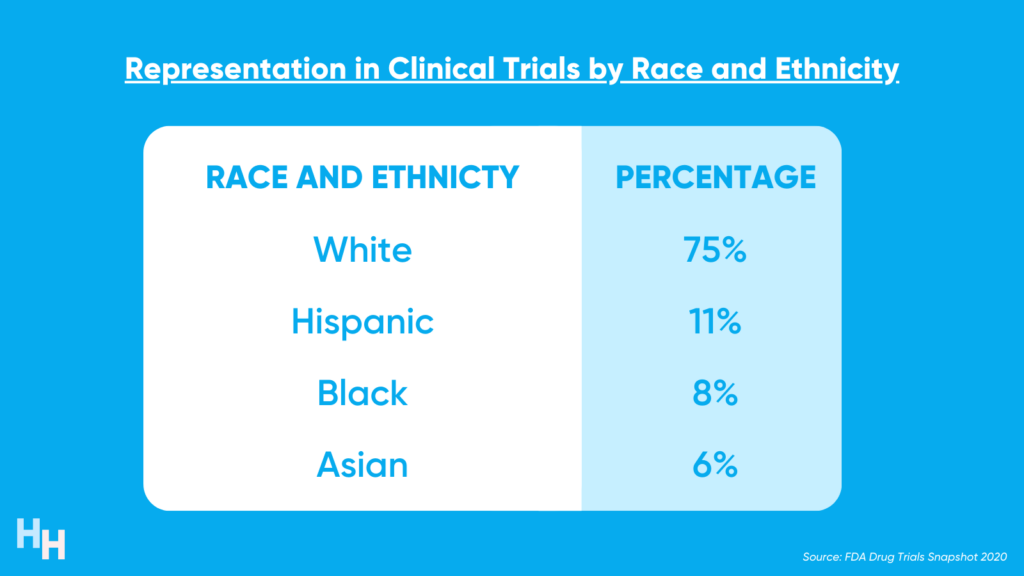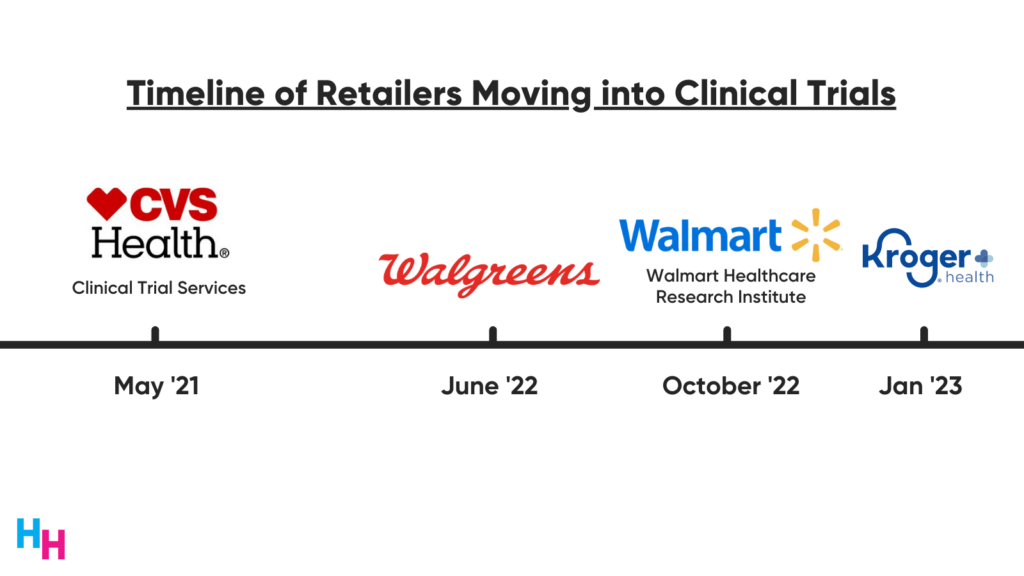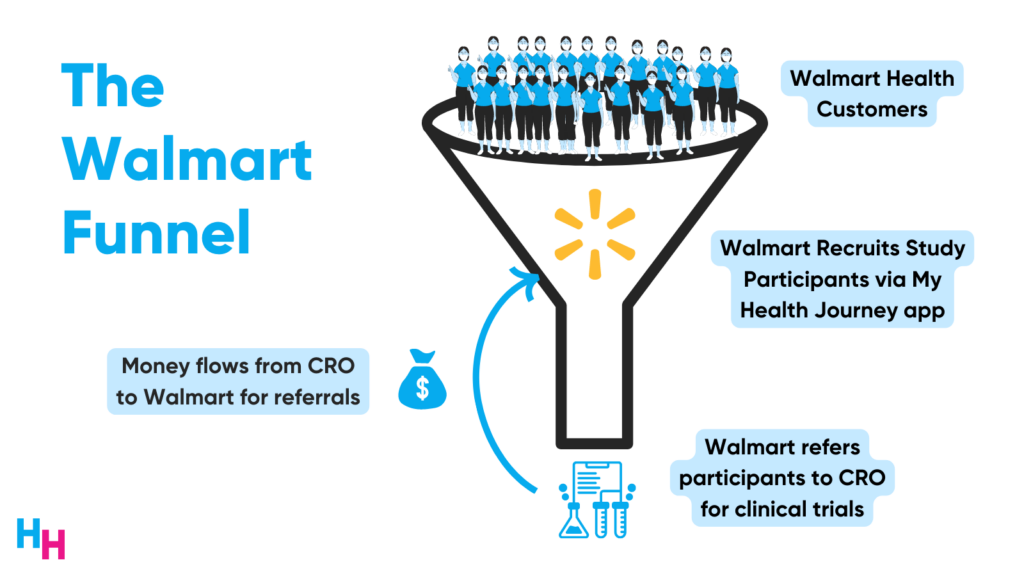20 May 2023 | Healthcare
CVS Health Pulls Clinical Trail Business: A Harbinger for Other Retailers?
By workweek
CVS Health confirmed it’ll be shutting down it’s Clinical Trial Services after a two-year run to focus on their core business.
What does CVS Health closing their clinical trials vertical mean for the other retailers?
In this article, I’ll highlight the current state of retail clinical trials, discuss the latest from CVS Health, and dive into the implications of CVS Health’s Clinical Trial Services closing down.
The Current State of Retail Clinical Trials
Large retailers like CVS Health, Walgreens, Walmart, and Kruger all launched new clinical trial verticals during the pandemic.
These retailers aim to address significant challenges clinical trials face in recruitment, diversity, and retention.
- Recruitment: Only 5% of eligible patients actually participate in clinical research. One study found that 33% of publicly funded trials required a time extension for not meeting recruitment goals. Lack of awareness of clinical trial enrollment, time commitment, traveling costs, and mistrust are some factors that contribute to poor recruitment. For example, 70% of potential clinical trial participants in the U.S. live more than two hours from the nearest study center.
- Diversity: Increasing diversity of participants in clinical trials is a high priority in research. Currently, clinical trial participants who are white are overrepresented while Hispanic, Black, and Asian participants are notoriously underrepresented. Such over/under representation of racial/ethnic groups adds bias to clinical trial results, limiting their generalizability. Read any clinical trial publication, and it’ll likely include lack of diversity as an area of bias.

- Retention: Around 20% of participants drop out of clinical trials, which also introduces bias in the results. Some of the reasons for poor retention are similar to recruitment challenges (mistrust, time commitment, traveling).
These challenges clinical trials face are well studied and established, allowing for retailers to swoop in to try and fix them. All of the retailers I mention below are uniquely positioned to impact the clinical trials space given their community reach (they’re everywhere!).

In May 2021, CVS Health launched their Clinical Trial Services to boost trial access and effectiveness, focusing on targeted patient recruitment, real-world evidence generation and studies, and trial delivery.
In June 2022, Walgreens initiated a clinical trial vertical to enhance patient access and retention by reimagining the patient experience (I wrote about it here). Their goal is to streamline clinical trial enrollment, foster diversity, and utilize their clinical data from their own VillageMD to match patients with suitable trials.
In October 2022, Walmart unveiled the Walmart Healthcare Research Institute, aimed at conducting clinical trials for chronic conditions like diabetes, cardiovascular disease, Covid-19, and asthma, particularly in underrepresented populations. Instead of directly administering these trials, Walmart acts as a referral source for academic centers and contract research organizations conducting them. Here’s a graphic I made in a previous newsletter explaining how the funneling works.

In January 2023, Kroger Health announced its foray into the clinical trial sector to enhance access and awareness among eligible participants. Select Kroger outlets will host trials in collaboration with sponsors, contract research organizations, and health systems.
CVS Health Pulls Out of Clinical Trials
CVS confirmed it’ll phaseout their clinical trials business by December 2024 to focus on its core business operations.
According to one report, CVS’s Clinical Trial Services grew 10x from year one to year two. The report indicates two likely reasons for the decision to shut down this vertical:
- Sales to revenue conversion issues. Payments for running clinical trials are execution dependent, so if you can’t recruit patients you can’t get paid.
- Thin margins. The costs of creating and maintaining a Good Clinical Practice (GCP) compliant environment for these trials were too high, decreasing margins.
Dash’s Dissection
Clinical trials are vital to the advancemenet of medicine, and I’ll be honest, I’m a bit upset CVS is pulling out. Their omnipresence (85% of Americans live within 10 miles of a CVS) and massive amount of patient data made them an ideal retailer for improving clinical trial recruitment, diversity, and retention. They have significant reach in communities and have the ability to decentralize clinical trials to the home or virtual.
Since the Clinical Trial Services were launched, CVS successfully ran 200 in-home clinical trials with its home infusion and tube feeding service Coram, conducted studies on new Covid-19 variants, formed a partnership with decentralized clinical trial company Medable, acquired home health company Signify Health, and formed a partnership with ProKidney to enroll patients in Phase III cell therapy trial.
It seems the clinical trials vertical isn’t part of CVS’s long term strategy. I suppose the Medicare Advantage market leveraged by Oak Street Health (acquired Q1 ‘23) and Signify Health is their long term focus, which makes sense (I discussed it here last week and chatted about it with Blake here).
CVS’s exit from the $22.6 billion clinical trials market is noteworthy considering the substantial profit potential in this sector, where pharmaceutical companies spend an average of $19.0 million on research and development. In this ecosystem, pharma companies (”sponsors”) typically fund Contract Research Organizations (CROs) to manage the entirety of the trial. For example, CVS collaborated with drug developers like Pfizer and CROs for comprehensive research solutions, Walgreens likely received per-participant fees from CROs for conducting trials, and Walmart’s partner, CTI Clinical Trial & Consulting Services, likely compensated them for patient referrals to trials.
So CVS is out, will retailers like Walgreens and Walmart follow?
I don’t think so. Walgreen’s chief clinical trials officer, Ramita Tandon, is adamant that clinical trials are part of the company’s long-term strategy.
We are full steam ahead as we continue to support many of our manufacturers that have come into the ecosystem since June [2022].
Like CVS, Walgreens has significant reach in communities, a massive amount of patient data through VillageMD, a major pharmacy, and home health company CareCentrix that can assist in trials.
Similarly, I anticipate Walmart will remain competitive, as their current focus appears to be broadening their healthcare reach in more communities, thereby enabling patient referrals to clinical trials. Walmart claims their research institute is already achieving impressive outcomes, boasting a referral rate three times the industry standard.
Overall, as focus shifts towards decentralized clinical trials—remote, technology-enabled trials—retailers like CVS, Walgreens, and Walmart are uniquely positioned to play a significant role. The FDA’s recent draft guidance on decentralized clinical trials aims to make these trials more accessible and diverse.
In summary, CVS Health will shut down their Clinical Trial Services, a significant move in the context of the current state of retail clinical trials. Despite their successful engagements and partnerships in clinical trial space, CVS chose to focus on core business operations. Meanwhile, other retailers such as Walgreens and Walmart seem to embrace this market, leveraging their extensive reach to address persistent clinical trial challenges. It’s noteworthy that these events are occurring amid an industry-wide push toward decentralized clinical trials, a shift that could potentially increase accessibility and diversity in this vital area of medical research.
Stay ahead in healthcare with my weekly Healthcare Huddle newsletter, covering digital health, policy, and business trends for 30,000+ professionals. Share with colleagues and subscribe here.